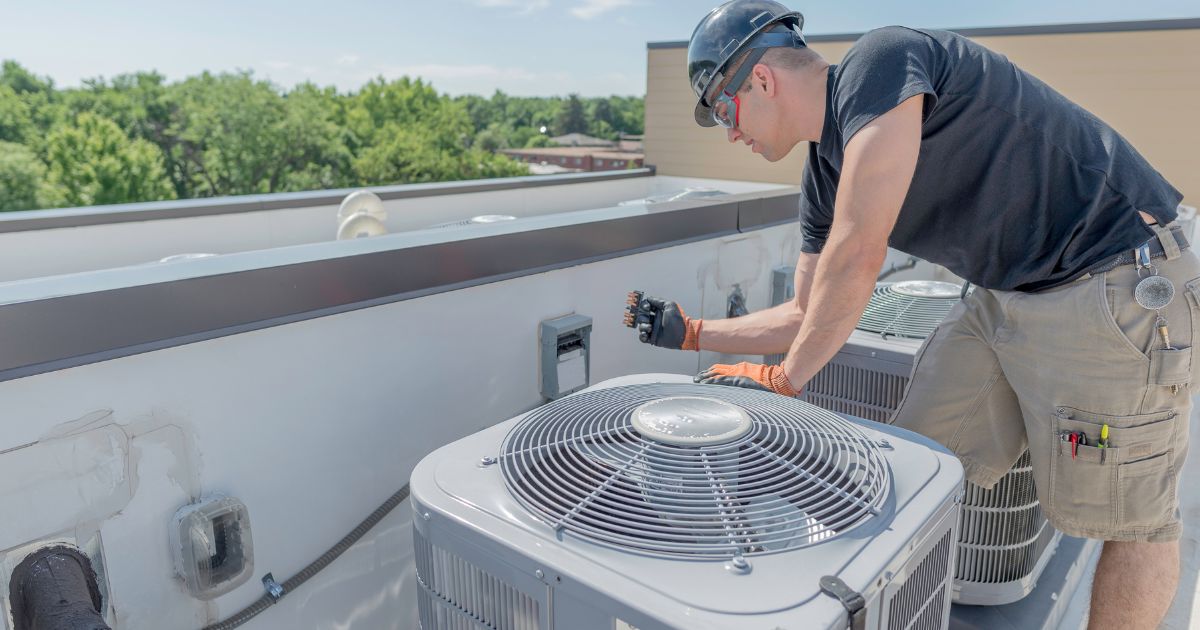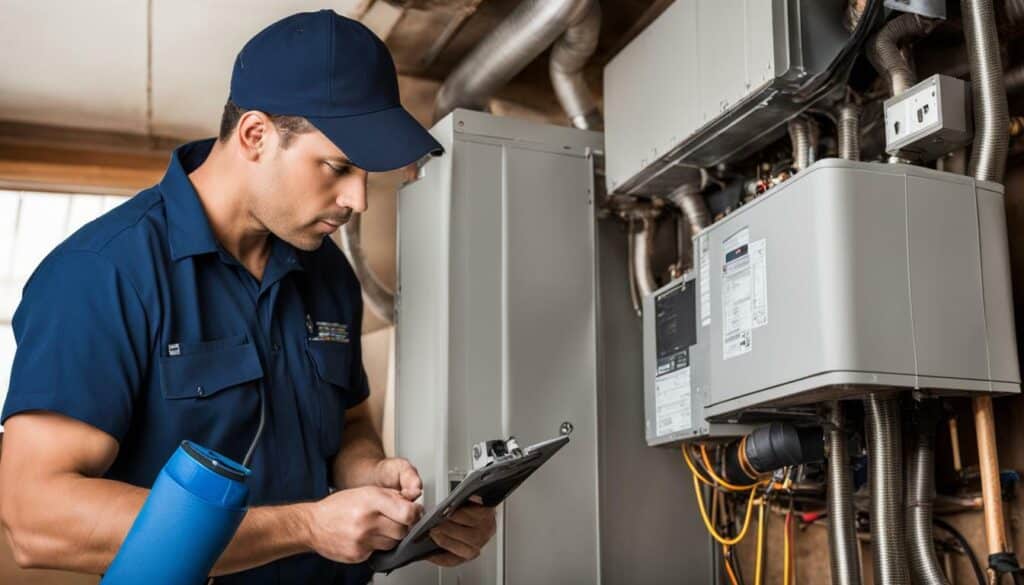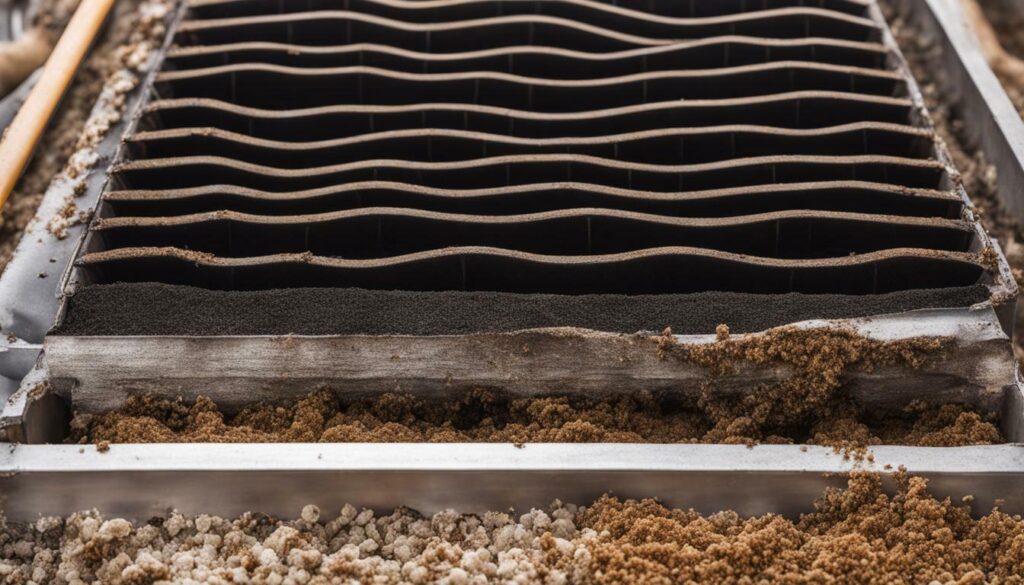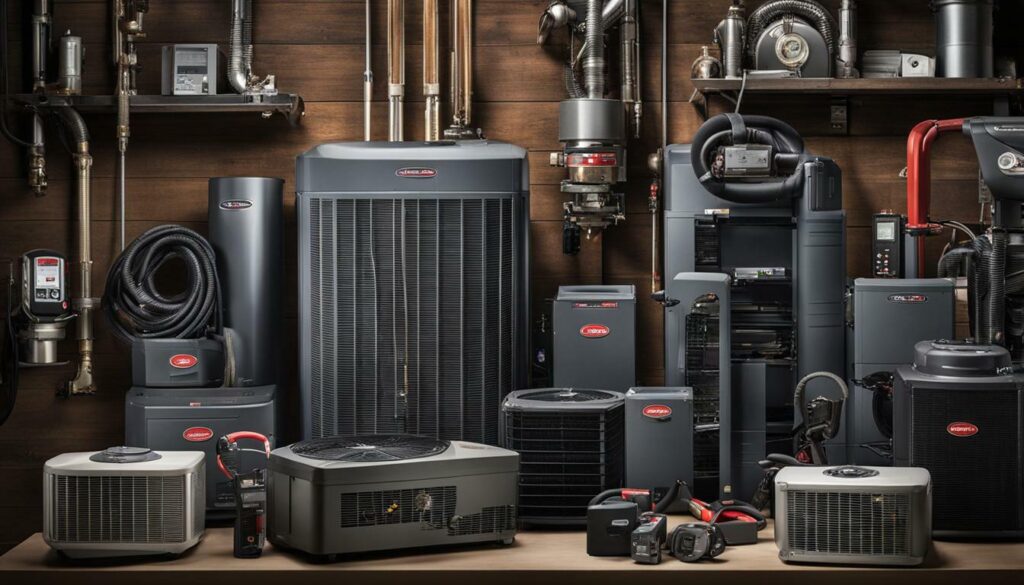
A Brief Overview of HVAC Systems
HVAC stands for Heating, Ventilation, and Air Conditioning. These systems are responsible for regulating temperature, humidity, and air quality in residential and commercial buildings.
A well-functioning HVAC system is essential for maintaining a comfortable living or working environment. There are many components to an HVAC system, including the furnace or air conditioner, air ducts, vents, filters, and thermostats.
A central heating and cooling system is the most common type of HVAC system found in Dallas homes. This type of system uses ductwork to circulate heated or cooled air throughout the building.
The Importance of HVAC in Dallas
Dallas experiences hot summers and chilly winters which makes having a reliable heating and cooling system essential for residents. Without proper temperature control during extreme weather conditions, homes can become uncomfortable and even dangerous to live in. Additionally, utility companies have strict energy efficiency requirements that homeowners must meet to avoid excessive energy bills.
A well-maintained HVAC system ensures optimal performance while also minimizing energy usage. Air conditioning repair is also a common need in Dallas due to the high demand placed on these systems during the hot summer months.
Excellent service from trained professionals can ensure that your AC unit remains reliable throughout its lifespan. An efficient and functional HVAC system is key for maintaining comfort levels in homes and businesses throughout the Dallas area regardless of outside temperatures.
Types of HVAC Systems in Dallas, TX
Central Air Conditioning Systems: Keeping Your Home Cool All Summer Long
If you live in the DFW metroplex, then you know how hot and humid summers can get. A central air conditioning system is a popular choice among homeowners in Dallas, TX, to combat the heat. These systems consist of an outdoor unit that houses the compressor and condenser and an indoor unit that distributes cool air throughout the house via ductwork.
Central AC systems require professional installation as well as regular maintenance to ensure optimal performance. While they tend to be more expensive upfront, they can save homeowners money on their utility bills over time.
Ductless Mini-Split Systems: Flexibility and Energy Efficiency
Ductless mini-split systems offer a great alternative to traditional central AC units. They are ideal for homeowners who don’t want to install ductwork or have limited space for equipment. These systems consist of an outdoor compressor unit and one or more indoor air-handling units that mount on the wall.
Mini-splits provide flexibility in terms of zoning, meaning you can control the temperature in individual rooms or zones within your home. They are also incredibly energy efficient since they only cool the rooms that need them.
Heat Pumps: Heating and Cooling in One Unit
Heat pumps are another popular option for homeowners in Dallas who want an all-in-one heating and cooling solution. These units work by transferring heat from one area to another instead of generating heat like a furnace does. In the summer, they extract heat from inside your home and release it outside to keep your house cool.
In winter, they do the opposite by extracting heat from the outside (even on chilly days) and releasing it inside your home for warmth. Heat pumps are incredibly energy-efficient but may not be enough if you live in an area with extremely cold temperatures.
Overall, there are many options when it comes to choosing an HVAC system in Dallas, TX. Homeowners should consider the size and layout of their homes, energy efficiency ratings and costs, and maintenance requirements before making a decision.
It’s always best to consult with a professional HVAC contractor who can help you choose the best system for your needs. In the next section, we’ll discuss common HVAC problems in Dallas and how to prevent them.
RELATED: Keeping Cool in the Big D: Your Ultimate Guide to Air Conditioning Repair in Dallas
Factors to Consider When Choosing an HVAC System in Dallas, TX
Size and Layout of the Home or Building
One of the most important factors to consider when choosing an HVAC system is the size and layout of your home or building. The size of your home determines the size of your HVAC system, and if it’s too small, it won’t cool or heat your home properly.
Conversely, if it’s too large, you’ll be wasting energy and money on a system that’s not necessary. The layout of your home also affects the efficiency of your HVAC system.
For example, if you have a lot of windows or skylights that let in natural light, this can increase heat gain in the summer months and make it harder for your AC system to keep up with demand. Additionally, if you have multiple floors or rooms with high ceilings, you may need additional equipment to ensure that each space is functioning properly.
Energy Efficiency Ratings and Costs
When selecting an HVAC system in Dallas Fort Worth area, where temperatures can be extreme at times all year round, one important consideration is energy efficiency ratings and costs. Energy-efficient systems can reduce energy bills while keeping homes cool during hot summers or warm during cold winters. The Department of Energy sets minimum standard requirements for energy efficiency ratings for heating and air conditioning equipment in areas such as Dallas, Fort Worth.
These standards are based on seasonal energy efficiency ratio (SEER) ratings for air conditioning systems as well as annual fuel utilization efficiency (AFUE) ratings for furnaces. While highly efficient systems may cost more upfront than less efficient models available from most HVAC companies serving the Dallas fort worth area- they save money over time by reducing monthly utility costs.
Maintenance Requirements
Another essential factor to consider when choosing an HVAC system is its maintenance requirements. Regular maintenance helps keep AC systems and heating air functioning properly. However, maintenance services such as air conditioning repair, replacing air filters, or fixing a blower motor can be costly so it’s important to choose a system with reasonable maintenance requirements.
Before selecting an HVAC contractor in Dallas Fort Worth area to install your HVAC system, it’s recommended that you ask for a written estimate on maintenance services. You may also want to consider whether the company background checks their technicians and if they provide service calls for emergencies.
It’s good practice to choose a professional HVAC contractor who has received certification from the Environmental Protection Agency (EPA) for handling refrigerants and installing high-efficiency systems. With the right knowledge and experience, they will be better equipped to help you select an HVAC system that meets all of your needs.
Common HVAC Problems in Dallas, TX, and How to Prevent Them
Airflow issues due to dirty filters or ductwork
One of the most common HVAC problems in Dallas, TX, is a decrease in airflow due to dirty filters or ductwork. Over time, dust and debris can accumulate in the filters and ducts, causing a blockage that restricts the flow of air through your system. This can cause your air conditioner or heating system to work harder than it needs to in order to heat or cool your home.
To prevent airflow issues, it’s important to change your air filter regularly. Most manufacturers recommend changing filters every 30-90 days, depending on the type of filter you have.
Additionally, regular duct cleaning can help prevent buildup within the ducts and ensure that your system is functioning properly. If you’re not sure how often you should have your ducts cleaned or need help changing your air filter, reach out to a local HVAC service provider for assistance.
Refrigerant leaks
Another common HVAC problem in Dallas is refrigerant leaks. Refrigerant is an essential part of any air conditioning system as it helps remove heat from the indoor environment and transfer it outdoors.
However, over time refrigerant lines can become damaged or corroded, which can lead to leaks. If you suspect that you have a refrigerant leak, it’s important to call an experienced HVAC technician right away.
Not only do low refrigerant levels reduce efficiency and increase energy bills, but they also result in damage to components like compressors and coils, eventually leading to costly repairs. Skilled technicians will inspect for leaks, repair them if necessary & recharge according to the manufacturer’s specifications.
Electrical problems
Electrical problems are another common issue faced by homeowners throughout Dallas when dealing with their HVAC systems. These issues could be caused by anything from faulty wiring to damaged electrical components and can cause your system to malfunction or even stop working altogether.
To prevent electrical problems, it’s important to have an experienced HVAC technician inspect your system regularly. Skilled technicians can identify any potential issues before they become major problems, preventing costly repairs in the future.
Additionally, they will also check the electrical connections of the HVAC unit during their inspection to ensure that everything is functioning properly. By changing your air filter regularly and keeping your ducts clean, having refrigerant leaks detected early and fixing them properly as well as getting regular inspections from a skilled technician for potential issues with electrical components you’re more likely to avoid these common HVAC problems that homeowners in Dallas face.
Benefits of Regular HVAC Maintenance in Dallas, TX
Improved Energy Efficiency
Regular maintenance of your HVAC system is essential to ensure that it is functioning properly and efficiently. An efficient air conditioning system will consume less energy, which ultimately translates into cost savings on your utility bill.
You can get the best air conditioning repair or maintenance services from reputable HVAC companies in Dallas, TX. During regular maintenance, the technician will check the refrigerant levels, clean the coils and filters, and inspect other components for any signs of damage or wear.
This ensures that your cooling system is running smoothly and using less energy to maintain a comfortable temperature inside your home or business. As a result, you can enjoy a more comfortable living space while reducing your carbon footprint.
Longer Lifespan for the System
Proper maintenance not only keeps your HVAC equipment functioning properly but also extends its lifespan. Regular servicing helps identify potential problems early before they escalate into costly repairs or replacements. Most major brands of heating and air conditioning systems recommend annual maintenance by an experienced HVAC contractor.
The technician will inspect all components of your system for wear and tear, lubricate moving parts, tighten loose connections, and replace worn-out parts as necessary. These routine checks help keep your equipment running smoothly for longer without requiring extensive repairs or replacements.
Improved Indoor Air Quality
Indoor air quality is a crucial aspect of maintaining a healthy living environment in Dallas, TX. A well-maintained HVAC system improves indoor air quality by removing dust, dirt particles, and allergens from the filter media during regular cleaning sessions. A dirty filter can impact airflow in an AC unit leading to clogged ducts and reduced efficiency that may result in higher energy consumption, thus costing you more money on utility bills over time.
Therefore it’s essential to schedule regular preventive maintenance with reliable HVAC contractors such as those recommended by the better business bureau. Regular HVAC maintenance is a must for residential customers and businesses alike.
A properly functioning HVAC system translates to improved energy efficiency, a longer lifespan of the equipment, and improved indoor air quality. By keeping your system well-maintained, you can rest assured that it will keep your home or business comfortable and healthy year-round.
Choosing the Right HVAC Contractor in Dallas, TX
Licensing and Certification Requirements
When it comes to choosing a professional HVAC contractor in Dallas, TX, one of the most important factors to consider is their licensing and certification. A licensed and certified technician will have undergone extensive training and have the necessary knowledge to handle any type of repair or installation services.
Therefore, before hiring any HVAC contractor, it is essential to check if they are licensed and certified by reputable organizations such as NATE (North American Technician Excellence) or ACCA (Air Conditioning Contractors of America). A professional HVAC contractor will be happy to provide you with their licensing information upon request.
Reviews and References from Previous Customers
Checking reviews from previous customers is another way of determining whether a particular HVAC contractor is reliable. Reviews can provide insight into the quality of their services, such as customer satisfaction levels, response time for emergency repair services, and overall professionalism.
Additionally, references from previous customers can give you an indication of what type of work you can expect from them. A reputable heating & air conditioning company in Dallas, Fort Worth, will be happy to provide you with several references.
Availability for Emergency Repairs
Another critical factor when choosing an HVAC contractor in Dallas, TX, is their availability for emergency repairs. You never know when your furnace or air conditioning system may stop functioning properly. In these cases, it’s important to have a professional who can respond quickly and fix your system with minimal hassle.
Therefore, before hiring any HVAC contractor make sure they offer 24/7 repair services at a reasonable price. Finding a reliable, professional HVAC contractor in Dallas, Fort Worth involves conducting thorough research into their licensing information, customer reviews & references, as well as availability for emergency services.
Additionally, ensure that they provide written estimates before commencing repair or installation work on your new HVAC system. Choosing a reputable company with certified technicians, such as those accredited by the Better Business Bureau in Dallas, TX, can help you save on energy bills in the long run while improving your indoor air quality.
RELATED: Chill Out: Unveiling the Top 5 HVAC Companies in Dallas
Frequently Asked Questions
What is the cheapest HVAC?
The cheapest HVAC system will vary based on the region and the specific needs of your home, but typically, window units or portable AC units are cheaper than central HVAC systems due to their lower installation and maintenance costs. However, these systems usually only cool one room at a time and lack the ability to provide heating, unlike a full HVAC system.
How long does HVAC last in Texas?
HVAC systems in Texas can last anywhere from 10 to 15 years, depending on the quality of the system, the intensity of use, and the level of maintenance. The hot climate and high usage in Texas can put more strain on the system, potentially shortening its lifespan.
Why are HVAC units so expensive?
HVAC units are expensive because they are complex systems that include several technologies: heating, cooling, dehumidifying, and air filtering. Additionally, the installation process is labor-intensive, often requiring professional technicians, and the units themselves are made of high-cost materials that need to withstand various weather conditions.
Is an HVAC fan cheaper than AC?
An HVAC fan, which is used for circulating air within the system, is typically cheaper to run than the entire AC system because it uses less energy. However, it doesn’t provide the cooling effect of an AC, it merely redistributes existing air.
How long does an HVAC last?
On average, an HVAC system can last between 15 to 25 years with proper maintenance and care. The lifespan can vary based on the quality of the system, how often it’s used, and the conditions in which it operates.
Why is replacing HVAC so expensive?
Replacing an HVAC system is expensive due to the cost of the new unit, as well as the labor-intensive process of removing the old unit and installing the new one. In addition, there may be extra costs associated with updating the home’s ductwork or electrical system to accommodate the new unit.
What is the most efficient HVAC?
The most efficient HVAC systems are typically those that have high SEER (Seasonal Energy Efficiency Ratio) and HSPF (Heating Seasonal Performance Factor) ratings. As of 2021, some of the top models include units from brands like Daikin, Lennox, and Trane, but newer and more efficient models may have been released since then.
Conclusion
Don’t Wait to Get the Right HVAC System
HVAC systems are essential for Dallas residents to maintain comfortable temperatures and good indoor air quality. The types of systems available include central air conditioning, ductless mini-splits, and heat pumps.
When choosing an HVAC system, it is essential to consider the size of your home or building, energy efficiency ratings, and maintenance requirements. Preventing common problems such as airflow issues due to dirty filters or ductwork, refrigerant leaks, or electrical problems can save you money in the long run.
Regular maintenance is critical for optimal performance and longevity of your system. You should choose a licensed and certified locally-owned HVAC contractor that conducts background checks on employees and provides written estimates before any work is completed.
Schedule Your Next Service Now
When it comes to heating and air conditioning in Dallas, TX, don’t wait until there’s a problem with your HVAC system before calling an expert for help. Choose a reputable contractor that offers excellent service with free estimates for new installations or repairs of existing equipment. Following these simple guidelines listed above when selecting a new HVAC system in Dallas, TX, or maintaining an existing one will ensure that you’ll get the best performance out of it while also ensuring that you have clean indoor air quality all year long!





